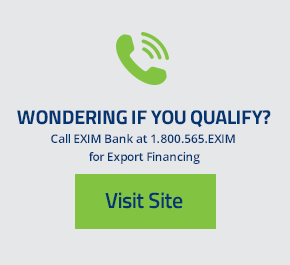Patricia Loui, Member of the Board of Directors at the Export-Import Bank of the United States (EXIM), and Tamara Maxwell, Director of Minority and Women-Owned Business, recently hosted a panel at EXIM’s 2015 Annual Conference dedicated to small businesses.
During the panel, three current EXIM customers answered questions from the audience and detailed their individual journeys to exporting and the best practices to follow when entering new markets. Love and Quiches Gourmet, Northrock, and Los Kitos Produce discussed what they think it means to be a U.S. small business in a competitive, global environment, and shared market-entry strategies small businesses can use to make the most of the international marketplace.
The panelists gave three, primary recommendations:
- Insure your foreign accounts receivable
- Know local customs, laws and regulations about your industry in your client markets
- Network, Network, Network!
Insure Your Accounts Receivable
It is estimated that U.S. banks are still lending $47 billion below June 2008 levels, and that U.S. businesses are feeling the pain of accessing financing. This is especially true for small business exporters. However, by insuring foreign accounts receivable, U.S. banks are more willing to lend against your business’ assets, knowing that if you’re not paid by a foreign customer, EXIM will reimburse you up to 95 percent of your foreign invoice.
Each panelist explained how export credit insurance allowed their business to confidently enter new markets without the fear of foreign customer nonpayment, and in turn, access financing that otherwise would not have been open to their businesses.
Know Local Customs, Laws, and Regulations About Your Industry
Certain industries, such as food exports, are highly regulated. Even in the E.U. policies can vary from country to country. When exporting, it is important that you know the laws and local regulations of your client markets. Not following customs laws or abiding by local regulations can result in a business’ exports being stuck at customs — something that can make all the difference when an export is a perishable.
When in doubt use a customs broker, a freight forwarder, or find a local distributor or supplier that can guide your business through local rules and regulations.
Network, Network, Network!
Business to business networking is key to being a successful exporter. Get to know your customers and clients before doing business with them, and find stakeholders whose goals and objectives are aligned with your own. They can be an unrivaled source of information.
Finally, do not underestimate institutional support. It is important that you leverage local, state and federal partners and resources, such as the Minority-Business Development Agency, Small Business Administration, and your local Export Assistance Center.
Want to Learn More?
Find out more about how EXIM can unlock financing and assist your business in managing commercial and political risks associated with exporting. Download the guide, Export Expertise: 10 Finance Tools to Grow Your Export Business.
Are you currently exporting and need assistance accessing financing or entering a new market? Contact a Export Specialist today to learn more about how EXIM can empower your business to manage risk and enter new markets:
